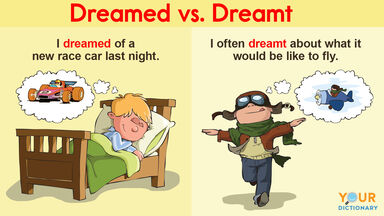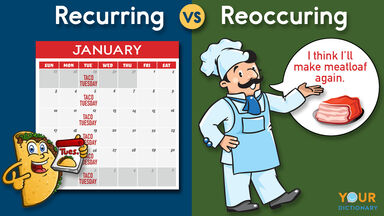Dream Definition
- suppose
- believe
- consider
- think of
- aspire
- look for the pot of gold
- search for the rainbow's end
- blow bubbles
- talk-through-one-s-hat
- let one's mind wander
- be moonstruck
- build-castles-in-the-air
- be on cloud nine
- be up in the clouds
- idealize
- to conceive of or devise, as by giving free rein to the imagination
Idioms, Phrasal Verbs Related to Dream
Origin of Dream
-
From Middle English dreem, possibly from Old English drēam (“joy, pleasure, gladness, delight, mirth, rejoicing, rapture, ecstasy, frenzy, music, musical instrument, harmony, melody, song, singing, jubilation, sound of music”), from Proto-Germanic *draumaz, *draugmaz (“festivity, dream, ghost, hallucination, delusion, deception”), from Proto-Germanic *draugaz (“delusion, mirage, illusion”), from Proto-Indo-European *dʰrAugʰ-, *dʰreugʰ- (“to deceive, injure, damage”); meaning influenced in Middle English by Old Norse draumr (“dream”), from same Proto-Germanic root. Cognate with Scots dreme (“dream”), North Frisian drom (“dream”), West Frisian dream (“dream”), Low German Droom, Dutch droom (“dream”), German Traum (“dream”), Danish drøm, Swedish dröm (“dream”), Icelandic draumur (“dream”). Related also to Old English drēag (“spectre, apparition”), Dutch bedrog (“deception, deceit”), German Trug (“deception, illusion”).
From Wiktionary
-
From Middle English dremen, possibly (see above) from Old English drīeman (“to make a joyous sound with voice or with instrument; rejoice; sing a song; play on an instrument”), from Proto-Germanic *draumijaną, *draugmijaną (“to be festive, dream, hallucinate”), ultimately from Proto-Indo-European *dʰrAugʰ-, *dʰreugʰ- (“to deceive, injure, damage”). Cognate with Scots dreme (“to dream”), West Frisian dreame (“to dream”), Dutch dromen (“to dream”), German träumen (“to dream”), Swedish drömma (“to dream, muse”), Icelandic dreyma (“to dream”).
From Wiktionary
The derivation from Old English drēam is controversial, since the word itself is only attested in writing in its meaning of “joy, mirth, musical sound”. Possibly there was a separate word drēam meaning “images seen while sleeping”, which was avoided in literature due to potential confusion with “joy” sense, which would account for the common definition in the other Germanic languages, or the derivation may indeed simply be a strange progression from “mirth, joy, musical sound”.
From Wiktionary
Attested words for “sleeping vision” in Old English were mǣting (Middle English mæte, mēte), from unclear source, and swefn (Modern English sweven), from Proto-Germanic *swefną, from Proto-Indo-European *swepno-, *swep-; compare Ancient Greek ὕπνος (hypnos, “sleep”).
From Wiktionary
Middle English drem from Old English drēam joy, music Old Saxon drōm mirth, dream
From American Heritage Dictionary of the English Language, 5th Edition
Related Articles
Find Similar Words
Find similar words to dream using the buttons below.





